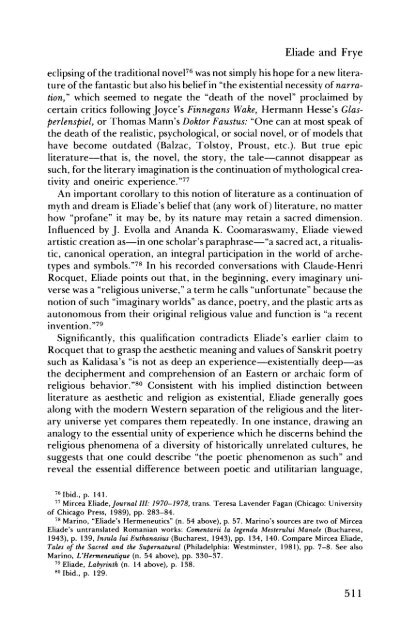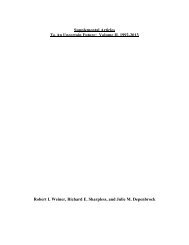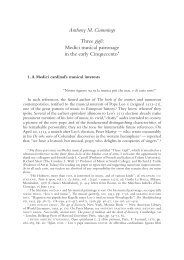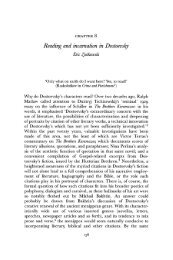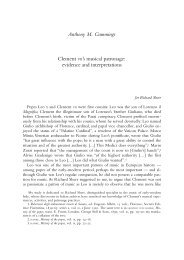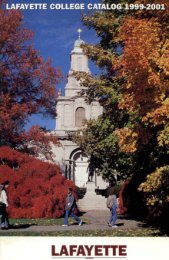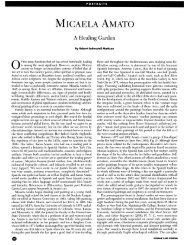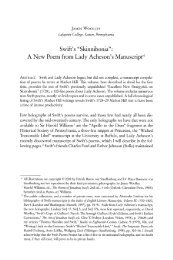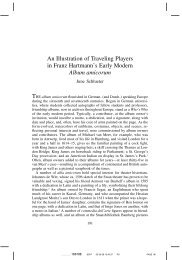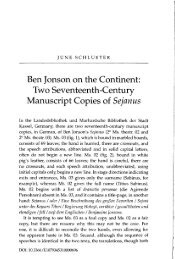Between Religion and Literature: Mircea Eliade ... - Lafayette College
Between Religion and Literature: Mircea Eliade ... - Lafayette College
Between Religion and Literature: Mircea Eliade ... - Lafayette College
You also want an ePaper? Increase the reach of your titles
YUMPU automatically turns print PDFs into web optimized ePapers that Google loves.
<strong>Eliade</strong> <strong>and</strong> Frye<br />
eclipsing of the traditional novel76 was not simply his hope for a new literature<br />
of the fantastic but also his belief in "the existential necessity of narration,"<br />
which seemed to negate the "death of the novel" proclaimed by<br />
certain critics following Joyce's Finnegans Wake, Hermann Hesse's Glasperlenspiel,<br />
or Thomas Mann's Doktor Faustus: "One can at most speak of<br />
the death of the realistic, psychological, or social novel, or of models that<br />
have become outdated (Balzac, Tolstoy, Proust, etc.). But true epic<br />
literature-that is, the novel, the story, the tale-cannot disappear as<br />
such, for the literary imagination is the continuation of mythological creativity<br />
<strong>and</strong> oneiric experience.77<br />
An important corollary to this notion of literature as a continuation of<br />
myth <strong>and</strong> dream is <strong>Eliade</strong>'s belief that (any work of) literature, no matter<br />
how "profane" it may be, by its nature may retain a sacred dimension.<br />
Influenced by J. Evolla <strong>and</strong> An<strong>and</strong>a K. Coomaraswamy, <strong>Eliade</strong> viewed<br />
artistic creation as-in one scholar's paraphrase-"a sacred act, a ritualistic,<br />
canonical operation, an integral participation in the world of archetypes<br />
<strong>and</strong> symbols."78 In his recorded conversations with Claude-Henri<br />
Rocquet, <strong>Eliade</strong> points out that, in the beginning, every imaginary universe<br />
was a "religious universe," a term he calls "unfortunate" because the<br />
notion of such "imaginary worlds" as dance, poetry, <strong>and</strong> the plastic arts as<br />
autonomous from their original religious value <strong>and</strong> function is "a recent<br />
invention. '79<br />
Significantly, this qualification contradicts <strong>Eliade</strong>'s earlier claim to<br />
Rocquet that to grasp the aesthetic meaning <strong>and</strong> values of Sanskrit poetry<br />
such as Kalidasa's "is not as deep an experience-existentially deep-as<br />
the decipherment <strong>and</strong> comprehension of an Eastern or archaic form of<br />
religious behavior."80 Consistent with his implied distinction between<br />
literature as aesthetic <strong>and</strong> religion as existential, <strong>Eliade</strong> generally goes<br />
along with the modern Western separation of the religious <strong>and</strong> the literary<br />
universe yet compares them repeatedly. In one instance, drawing an<br />
analogy to the essential unity of experience which he discerns behind the<br />
religious phenomena of a diversity of historically unrelated cultures, he<br />
suggests that one could describe "the poetic phenomenon as such" <strong>and</strong><br />
reveal the essential difference between poetic <strong>and</strong> utilitarian language,<br />
76 Ibid., p. 141.<br />
77 <strong>Mircea</strong> <strong>Eliade</strong>, Journal III: 1970-1978, trans. Teresa Lavender Fagan (Chicago: University<br />
of Chicago Press, 1989), pp. 283-84.<br />
78 Marino, "<strong>Eliade</strong>'s Hermeneutics" (n. 54 above), p. 57. Marino's sources are two of <strong>Mircea</strong><br />
<strong>Eliade</strong>'s untranslated Romanian works: Comentarii la legenda Mesterului Manole (Bucharest,<br />
1943), p. 139, Insula lui Euthanasius (Bucharest, 1943), pp. 134, 140. Compare <strong>Mircea</strong> <strong>Eliade</strong>,<br />
Tales of the Sacred <strong>and</strong> the Supernatural (Philadelphia:<br />
Marino, L'Hermeneutique (n. 54 above), pp. 330-37.<br />
79 <strong>Eliade</strong>, Labyrinth (n. 14 above), p. 138.<br />
80 Ibid., p. 129.<br />
Westminster, 1981), pp. 7-8. See also<br />
511


